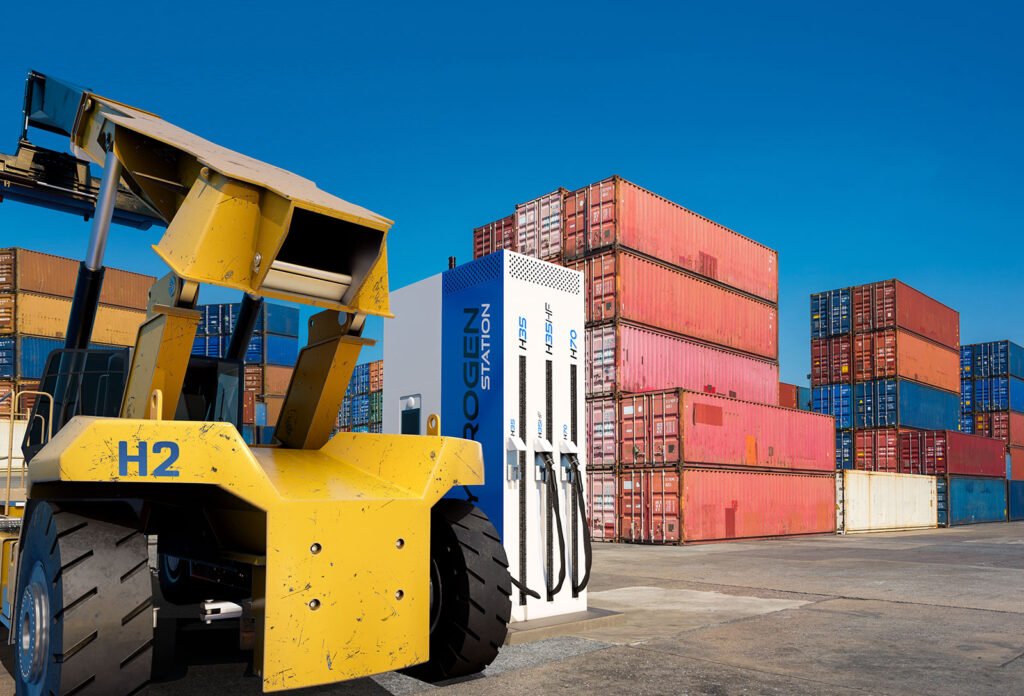What are our dedicated hydrogen solutions for sea transport?
With HRS hydrogen refueling stations, we can support you in your low-carbon mobility projects for port applications to guarantee the performance of your supply chains, sustainable development of your business and a reduction in your carbon footprint.
Are you looking for support with your hydrogen mobility project for port applications? Contact our experts.
Hydrogen at the heart of the port ecosystem
Hydrogen offers a concrete solution to meet a full range of requirements both inside and outside ports.
Numerous types of mobility are involved in port operations:
- road, waterway, sea, and rail activities
- mobility dedicated to specific port usage
- mobility for logistics flows linking the port to both local and more distant areas of its region.

Hydrogen for mobility applications outside the port
Sea and/or waterway activity plays a key role in the activity of a port.
It is now possible to convert any type of boat to hydrogen: cargo boats for goods transport, container ships, ferries, fishing fleets or river barges.
Some boats are already in service: in 2017, the first hydrogen catamaran was launched by Energy Observer, and the first liquid hydrogen ferry in 2023 by Norled.
Hydrogen for mobility applications inside the port
Particularly well suited to intensive mobility and goods transport, hydrogen is an ideal solution for various logistics and industrial activities operating inside ports: container trucks, straddle carriers, stackers, loaders, tractors, hooklifts and forklifts, etc.
Fleets of LVs and LCVs, service vessels and even fixed equipment (gantries, cranes, etc.) can also be powered by hydrogen.
Guaranteeing vehicle continuity of service
HRS can install hydrogen refueling stations in port areas that are modular and adaptable to your requirements.
A single HRS hydrogen station can be used to refuel all port mobility applications via several dispensers delivering hydrogen at different pressure levels (350 bar, 700 bar). It can be installed near your vehicle fleet's parking area or in a location with frequent traffic.
The station can be used for either rapid refueling of individual vehicles or slow refueling of several vehicles simultaneously on site.
Advantages of hydrogen for sea transport

Long range
Full hydrogen or hybrid solutions have a range of several 100 kilometres, guaranteeing continuity of service which is particularly well suited to waterway and sea transport.

Fast recharging
Hydrogen refueling reduces vehicle standstill times. The fueling protocol enables fast refueling of heavy-duty vehicles: ~15 minutes for a 30 kg tank.

Optimised payload
Switching to hydrogen has no impact on the vehicle's volume or payload.

Reliability and safety
Our stations are manufactured on an industrial scale. Our dispensers comply with fueling protocol SAE J2601/ISO 19880-1 T30 and are confirmed by the CEP (Clean Energy Partnership)

Reduced environmental footprint
Hydrogen vehicles produce electricity by combining H2 and O2, and emit only water vapour. No CO2 is emitted during this process.

Space saving
With hydrogen, a single dispenser is sufficient to refuel several vehicles (sea, road, logistics): a reduced and optimised footprint which frees up space for your port activity.

Reducing noise pollution
Hydrogen powered vehicles are very quiet for significantly lower noise pollution from your activities.